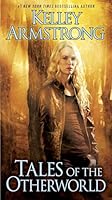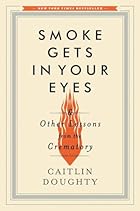
Title: [Tales of the Otherworld]
Author: Kelley Armstrong
Genre: Urban Fantasy
Medium: Paperback
Acquisition: Vacation Purchase
Date Completed: January 12, 2015
Rating: ***
I've read this book before; as a matter of fact, I've purchased this book before, as a hardback. I'm not sure whether my slip in memory is telling of my own frazzled state, or the quality of the stories. Ultimately, though, I do not regret purchasing it in two separate formats, as Armstrong promises that all proceeds will benefit a Canadian literacy charity. In the end, I'd say it's a great mistake for a lazy winter afternoon.
4.

Title: [Smoke Gets in Your Eyes: And Other Lessons from the Crematory]
Author: Caitlin Doughty
Genre: Memoir
Medium: Hardback
Acquisition: Purchased on colleague rec
Date Completed: January 25, 2015
Rating: ***
As most of my review is critical, I think I should start by stating simply that I enjoyed most of this book.
Caitlin Doughty has an agenda made blatantly clear from the beginning, not unlike Jessica Mitford, whose efforts Doughty both applauds and condemns. Well informed of the funerary practices of cultures other than the sanitized American standard, Doughty preaches for a new understanding of death and corpse disposal - one that recognizes that "natural" is not formaldehyde and grease paint, but skin slippage and face rot.
Responses to Doughty's book will likely hinge on one's own beliefs. Not unfamiliar with the industry, thanks to other similar popular texts, and the cultural histories she cites, thanks to a curiosity Doughty would find sympathetic, I found int he text what I hoped -anecdotes of the industry. However, I would not be surprised if her heavy criticism and lack of sympathy would alienate some readers. She does, to a great extent, lecture the American public for their failures. While I can appreciate her efforts and her arguments, and found a great sense of realism and peace in her narratives, I fear her rhetoric will ultimately prove unsuccessful.
Then again, an Oprah stooge loved it, so maybe I'm the one off-base. For those with morbid curiosity, dig in - it's not a bad ride.
5.

Title: [One Flew Over the Cuckoo's Nest]
Author: Ken Kesey
Genre: Fiction
Medium: Paperback
Acquisition: Work Text
Date Completed: January 30, 2015
Rating: *****
I've been using One Flew Over the Cuckoo's Nest in my freshman classes for quite some time now, and today I am reflecting on the changes to my approach and personal analysis as I read the book every year (if not twice a year). At first I began with character analysis, looking at the saturation of detail and the roles f minor characters in shaping the larger narrative. Then, my focus shifted to the unreliable narrator, and how readers can parse the "truth" through some close reading and critical thinking. Most recently I shifted to varying definitions of "madness" and the institutional arguments o the text. This semester, though, I've come to some of my favorite arguments yet.
I began our reading by considering the unreliable narrator, and the role of madness. But I argued that the narrator isn't most unreliable for his hallucinations and paranoia, but rather for his personal prejudices - that Bromden himself expresses critical opinions of other marginalized groups, and why he might do so. Most productive, though, was a study of masculinity, and the archetypes Kesey includes on the ward - we identified "types," thought about the implications of those types, and looked closely at type-deviation to find arguments and responses to archetypes. This shifted the discussion to McMurphy's role as "savior" on the ward, and whether he internalizes and accepts this designation, or if it's against his type - if the patients, and the audience, cast him as a hero, when he has no intention of behaving heroically. Finally, we wrapped today with a reconsideration of Nurse Ratched. Though I've come to no conclusion, I had students consider the evidence against her supposed villainy, including the narrow lens of her narrators (Bromden, Harding, and McMurphy), the admittedly-fallacious histories they construct for her, her actual job on the ward, and her resources in her role. I never suggest she's a good person, but I pointed to several passages that allow us to question whether she i the maniacal tyrant some of the characters would have audiences believe.
It made for some great questions, a good deal of resistance, and testing of the analytical waters. Next week we'll move into multimedia comparative analysis (film and comic), and then on to a comparison with Jackson's We Have Always Lived in the Castle. I think we've hit our grove.
No comments:
Post a Comment